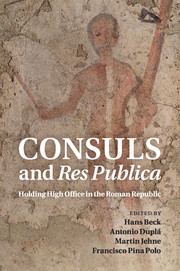Book contents
- Frontmatter
- Contents
- Preface
- Contributors
- The republic and its highest office: some introductory remarks on the Roman consulate
- Part I The creation of the consulship
- Chapter 1 The magistrates of the early Roman republic
- Chapter 2 The origin of the consulship in Cassius Dio's Roman History
- Chapter 3 The development of the praetorship in the third century bc
- Part II Powers and functions of the consulship
- Part III Symbols, models, self-representation
- Part IV Ideology, confrontation and the end of the republican consulship
- Bibliography
- Index of persons
- Subject index
Chapter 2 - The origin of the consulship in Cassius Dio's Roman History
from Part I - The creation of the consulship
Published online by Cambridge University Press: 07 September 2011
- Frontmatter
- Contents
- Preface
- Contributors
- The republic and its highest office: some introductory remarks on the Roman consulate
- Part I The creation of the consulship
- Chapter 1 The magistrates of the early Roman republic
- Chapter 2 The origin of the consulship in Cassius Dio's Roman History
- Chapter 3 The development of the praetorship in the third century bc
- Part II Powers and functions of the consulship
- Part III Symbols, models, self-representation
- Part IV Ideology, confrontation and the end of the republican consulship
- Bibliography
- Index of persons
- Subject index
Summary
For the Roman upper class in the late Republic the institution of the annual dual consulship, in which two colleagues with equal powers formed the chief executive of the state, was synonymous with the republican system of government. Since it ensured the sharing of power, it was a bulwark against domination by an individual and for the elite at least a fundamental guarantee of their collective and personal political liberty. Yet the uniform ancient view that such a dual magistracy was established immediately after the overthrow of the monarchy has often been challenged, usually in the belief that a single chief magistrate (with or without subordinates) was essential for effective government. The arguments adduced to support such a position are for the most part, however, a priori.
This statement is quoted from the second edition of the Cambridge Ancient History and seems to be fully correct. Nevertheless there is an “argument” that has not attracted particular attention so far: at least one ancient source denies that “such a dual magistracy was established immediately after the overthrow of the monarchy.” This source is Cassius Dio's Roman History. Dio's reconstruction of the origin of the consulship is rather different from the traditional one and seems to be, at its core, more ancient as well. Before coming to the point, in order to better appreciate the value of this unconventional tale, it is worth dwelling briefly on the circle of Severan jurists whom Dio knew well, on Dio's attention to the pre-Livian tradition and on his interest in the history of Roman institutions.
Preliminary remarks
A distinguishing characteristic of Cassius Dio's Roman History is its strong interest in the history of Roman institutions and magistracies, already pointed out in the early twentieth century by Cary (“he excels the other historians of Rome in the attention paid to constitutional and administrative matters”) and Vrind. De Sanctis passed similar judgment, though adding a negative comment on Dio's reliability as a whole: “Superiore d'assai per intelligenza pratica delle cose politiche e per cognizione dell'organismo dello Stato romano a Livio e a Dionisio, i suoi tentativi però non approdarono che ad alterare ancora la tradizione già sì alterata che era pervenuta fino a lui.” Hinard has recently come back to the topic: “On n'a pas assez remarqué que Dion prêtait une attention particulière aux questions institutionnelles et que c'est probablement dans ce domaine qu'il est le plus utile;” sometimes “c'est Dion qui donne les indications les plus précises, les autres sources ne servant qu’à recouper ces informations.” At the same time the severe opinion that made Cassius Dio “le plus prodigue en renseignements, vulnérable aux critiques” has given way to more cautious judgments (“if the work is not a masterpiece, its author deserves attention and respect”) and even to real eulogies: “In using his Roman history…we tend to slight or pass by the solid contributions he often makes to our knowledge. Greater alertness to his virtues as an historian, to the valuable, sometimes unique interpretations and data he provides is needed to achieve a more balanced perception of Cassius Dio's work;” “Dion est bien un historien qui n’était pas dépourvu de talent et qu'on aurait tort de négliger parce qu'il avait une immense culture et qu'il a travaillé avec intelligence et une indiscutable compétence, du moins pour la période républicaine.”
- Type
- Chapter
- Information
- Consuls and Res PublicaHolding High Office in the Roman Republic, pp. 41 - 60Publisher: Cambridge University PressPrint publication year: 2011
- 1
- Cited by

